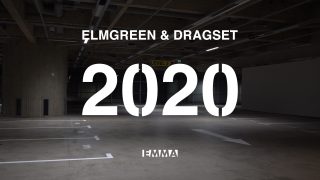Espoo Museum of Modern Art

Elmgreen & Dragset: 2020
Elmgreen & Dragset often use the exhibition venue as an essential part of their work by transforming the gallery space into a completely different environment: “like a film you can walk into”. At EMMA they have responded to the museum’s béton brut architecture and transformed the space into a fictional car park. The exhibition, entitled 2020, incorporates real cars, road markings and a selection of Elmgreen & Dragset’s sculptures, both new and familiar, that together create new sets of narratives. The museum space has been turned into a surreal parking garage which invites the visitors to make their own stories and associations.
The car park concept addresses some of the central questions in Elmgreen & Dragset’s artistic practice, like privatisation, public space, marginalisation, queer culture and materialism. They challenge the conventions of how we see and experience art, also how we see EMMA and Tapiola. 2020 not only raises questions about the role of the car in modern society and what it means culturally but also about that part of public architecture, which can be described as ‘non-places’.
Underlying the narrative of the exhibition is a concern for humanity and the loss of a sense of community in a culture that emphasises the individual. Have we, in the year 2020, reached a juncture where we will finally have to take stock of the way we lead our lives?
Read more about the themes of the exhibition below.
”The lines on the street are the only truly global language”
Car parks are visually and structurally an intrinsic part of today’s urban architecture. They are a product of modern capitalism and a symbol of the way we try to organise and control mobility in our society. They can be considered places of transit where one rarely lingers, places that do not stand out. In popular culture, films and books, the car park has often served as a backdrop of clandestine activity and unlawful deeds. By turning EMMA’s space into a car park, Elmgreen & Dragset let us reflect upon how we as citizens have become used to navigating through these so-called non-places.
Click the “i” icon on the corner of the image to read more about the work.
”Oh Lord, won’t you buy me a Mercedes Benz?”
The works under this thematic section deal with materialism and our desire and longing for wealth and fame, or at least for a better life. A cash machine, open 24/7 glows like a capitalist altar in the space. Further on, the whirling carousel sculpture, entitled Social Media, brings to attention our digital culture, which relentlessly seeks new spectacles that potentially could go viral. Ironically, the art world with all its curiosities can also play a part in generating spectacle.
Click the “i” icon on the corner of the image to read more about the work.
Masculinities
Elmgreen & Dragset challenge notions of masculinity in their works. The small boy, as a leitmotif in their sculptures, is often shown vulnerable, feeling wonder, fear, excitement or discomfort. This provides a variety of alternatives to traditional depictions of masculinity which often portray the male figure as heroic, dominant and emotionless. In Elmgreen & Dragset’s works the politics of sexuality is a major theme. They draw on queer experience to subvert institutions and structures that do not allow difference.
Click the “i” icon on the corner of the image to read more about the work.
Past Future
Here the garage has given way to a dystopian scene. The works in this final section speak about our times characterised by uncertainty, exclusion and inequality. The misanthropic works seem to imply that the bright future is far behind us – we have lost our faith in everlasting progress. The title Past Future refers also to a complex verb form: the past future tense.
Click the “i” icon on the corner of the image to read more about the work.